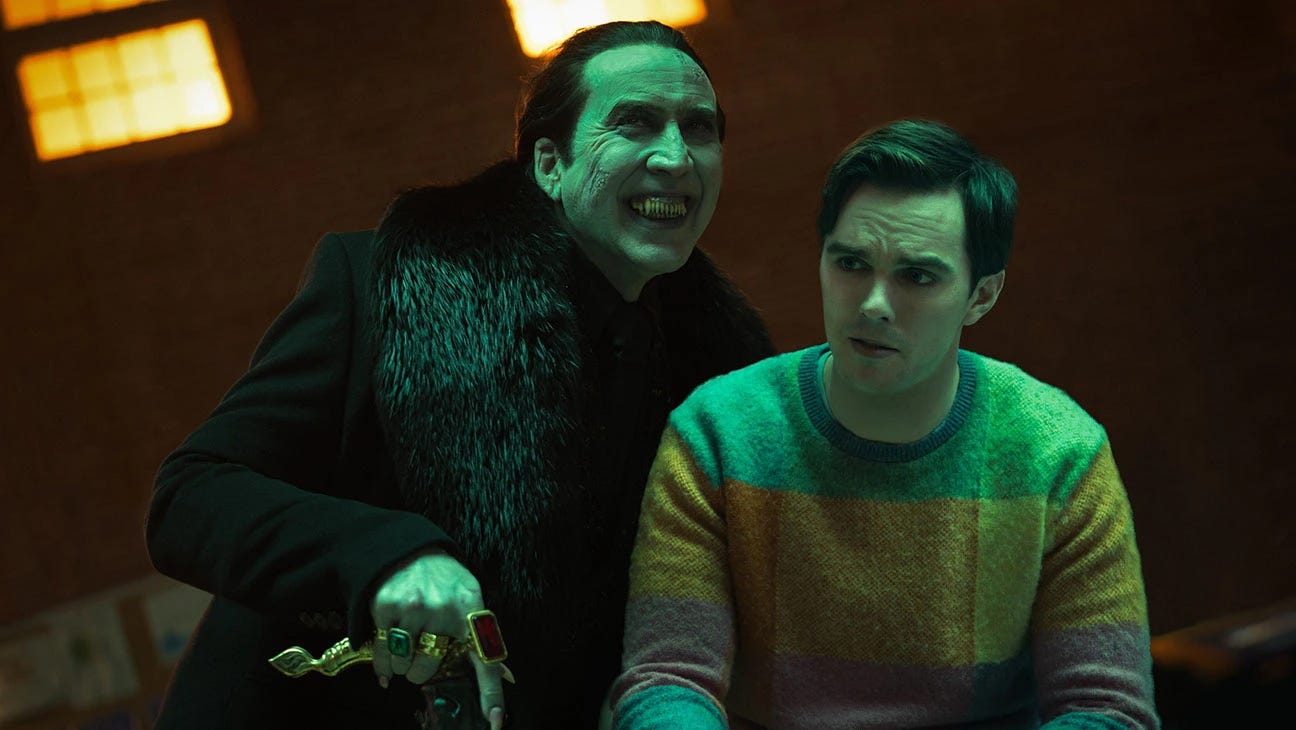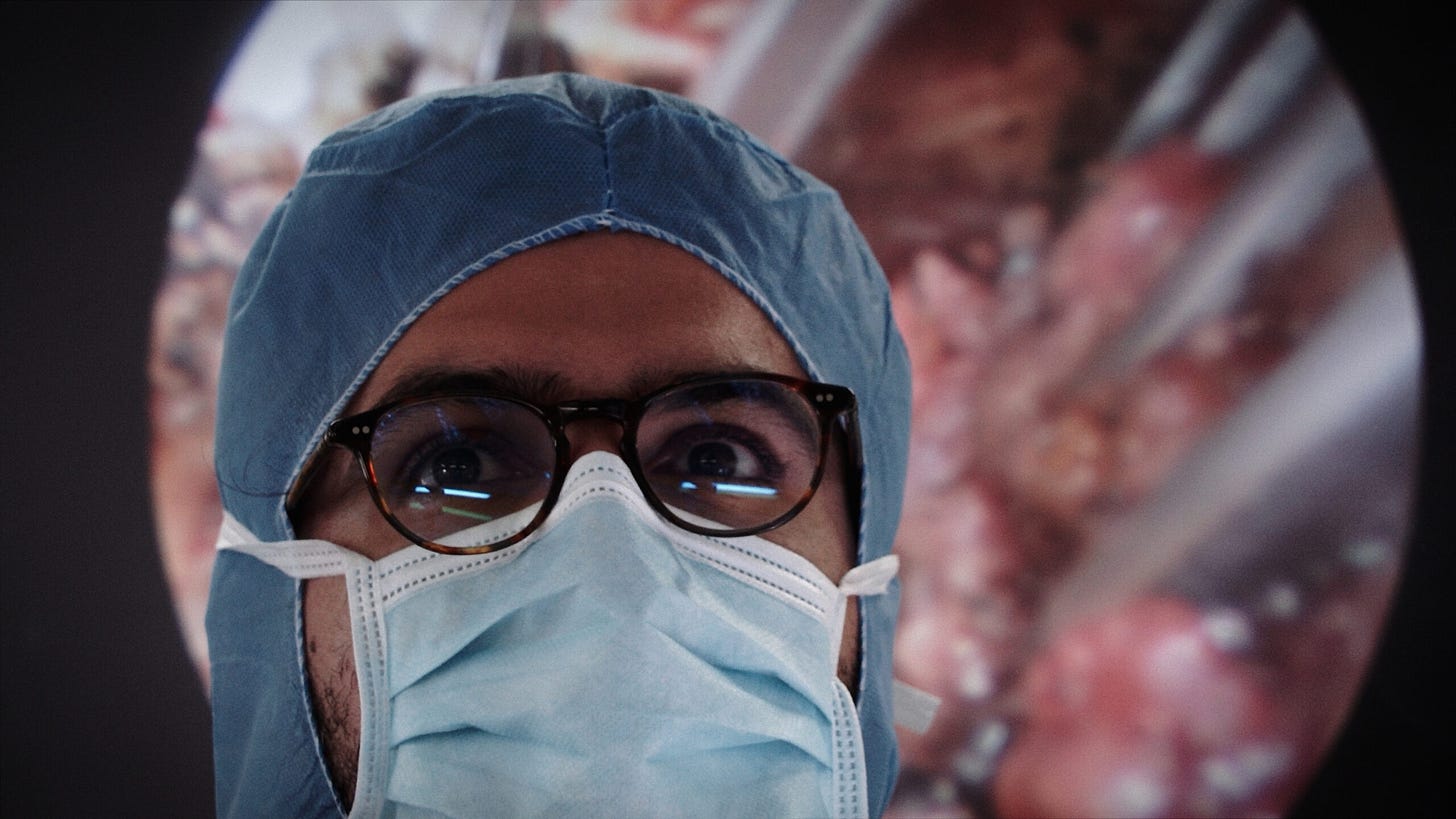In Review: 'Renfield,' 'De Humani Corporis Fabrica'
Two new films take different approaches to exploring human viscera.
Renfield
Dir. Chris McKay
96 min.
Like its protagonist, Renfield is a movie defined by a seemingly irresolvable internal conflict. The film repeatedly offers glimpses of the light, funny movie it could be before reverting back to the mostly dull horror-comedy driven by violent, tongue-in-cheek action scenes it actually is. For every clever idea, like a criminal who invites repulsion less for his violence than his love of ska, the film offers several unbroken minutes pokily exploring its central premise: What if Dracula’s long-serving familiar wanted to break away from his boss and start a life of his own? That’s not a bad idea for a movie, even if it’s not too far removed from the vampires-in-the-modern-world comedy of What We Do in the Shadows. The problem is the film, scripted by Ryan Ridley (Rick & Morty) and directed by Chris McKay (The Tomorrow War), treats it less as a jumping off point than a final destination.
Nicholas Hoult plays Renfield as a sensitive fellow who’s come to regret the outcome of the real estate deal he attempted to strike with Count Dracula (Nicolas Cage) decades before. As the film opens, Renfield’s attempting to rebuild his life with Dracula in New Orleans and steer their existence in a slightly more moral direction by only bringing his master bad people to feast on. It’s not a sustainable arrangement, and as Dracula’s demands for purer victims (like, say, nuns or a bus filled with cheerleaders) grow more intense, Renfield’s identity crisis mounts, a situation exacerbated when he finds himself smitten with Rebecca (Awkwafina), a cop seeking revenge on the drug cartel that killed her father in the line of duty.
Hoult and Awkwafina struggle to animate a script that’s better at one-off gags (as when Renfield walks into a bar filled with nuns and cheerleaders) than developing characters. Working under some impressive make-up, Cage is tremendously fun as an over-the-top Dracula, whom he plays like the sophisticated, commanding bloodsucker his Vampire’s Kiss character wished he could be. But the film deflates when he’s not on screen and it returns to a lot of unfunny around Renfield and Rebecca’s attempts to take down a drug cartel run by a would-be kingpin (Ben Schwartz) and his mom (Shohreh Aghdashloo). It’s busy and loud but those qualities never make it seem vital. Where it should be lively, it feels undead. —Keith Phipps
Renfield opens widely tonight.
De Humani Corporis Fabrica
Dir. Lucien Castaing-Taylor, Véréna Paravel
115 min.
After the disastrous Cannes premiere of Vincent Gallo’s The Brown Bunny in 2003, a public feud erupted between Gallo and Roger Ebert, who had walked out of the screening and declared it the worst film ever to play at the festival. Among the more memorable exchanges—all won by Ebert, who answered Gallo’s viciousness with wit—was Gallo wishing colon cancer on Ebert, who replied that watching his own colonoscopy was more entertaining than The Brown Bunny.
De Humani Corporis Fabrica, the new documentary from the directors of Leviathan, puts Ebert’s jape to the literal test. And while “entertaining” isn’t quite the word to describe their spelunking inside the pulsing caverns of the human body, there’s a kind of beauty in watching these fleshy landscapes up close and marveling at the tender machinery that keeps us all alive. Lucian Castaing-Taylor and Véréna Paravel hail from the Sensory Ethnography Lab at Harvard University, and anyone who’s seen Leviathan, their extraordinary doc about work in the fishing industry, might know what to expect here—extreme close-ups, an acute attention to sound, and an emphasize on the visceral rather than the informational. And just as you leave Leviathan knowing nothing and everything about laboring on a fishing boat, De Humani Corporis Fabrica teaches you nothing and everything about surgery. They’re about not how-to sessions. They’re about exploring the essence of things.
The title refers to a foundational 16th century book on human anatomy and the film was shot in various hospitals around Paris, as doctors perform surgeries and autopsies on different parts of the body. Nothing of that information is in the documentary itself, because Castaing-Taylor and Paravel reject the context of conventional nonfiction films and largely jettison their structures, too, though they do have a keen feel for how their images and sequences flow together. In their deployment of the microscopic cameras available to modern surgeons, they enter spaces like the pituitary gland in the brain or gnarly canals of the small intestine. The effect is akin to the great 1996 French documentary Microcosmos, which turned the tiniest insects on the planet into creatures out of a Godzilla movie. We marvel at wonders normally invisible to us.
There are some procedures that happen outside the body, too, so it should be noted that those too queasy to consider a medical school track might have trouble with De Humani Corporis Fabrica. Castaing-Taylor and Paravel go on the lower-body side of the curtain for a caesarian section, for example, and observe the work of an unseen doctor as he casually probes through the tip of a penis. There’s no evidence here that they’re deliberately provoking the audience so much as respecting the nature of the job. Some of the film’s best moments, in fact, pick up on gripes between surgeons and assistants about budget gaps and scheduling or staffing problems. A few of them even wax philosophical about having such close access to human frailty. “You develop a carpe diem attitude because of the horrors you see,” says one ICU worker. “You try to enjoy life. And you have a very clear vision of death and dying.”
Castaing-Taylor and Paravel want to make that vision clear for us, too, while suggesting a sincere appreciation for the professionals who take care of the sick and the odd majesty of the human body. David Cronenberg should be reaching for his wallet. —Scott Tobias
De Humani Coporis Fabrica opens in limited release tomorrow.









The latest string of high concept, one joke premise movies has been pretty hit and miss. I thought "What if Santa was in a violent action thriller?" was a good time but I skipped "What if...cocaine bear?" after reading reviews. It appears that Renfield falls into the latter camp but man, I still want to see Nicolas Cage's Dracula.
De Humani Corporis Fabrica sounds absolutely fascinating. Reminds me of when we got to watch some videos of surgeries when I had a relative who was a surgeon. Can't wait.
I really liked Leviathan and enjoyed Manakamana. Somewhat nervous about how I might respond on a visceral level to the same technique applied to the medical procedures. It might be something of a crapshoot. I consider my home theater system a good one, so I suspect I'll probably wait to watch it at home, where, should something just start to trigger something, I can pause.
Or I could always just employ the (ending of) Pink Flamingos and Salo strategy of just covering my eyes for a while.